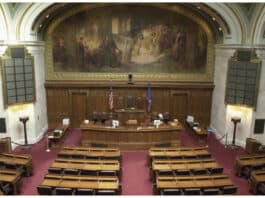(The Center Square) – Milwaukee’s looming pension spike is front and center in the city’s next proposed budget.
Milwaukee Mayor Tom Barrett on Tuesday unveiled his 2021 spending plan.
The headline grabber is a reduction of 120 police positions.
“This change is mandated by our current budget reality,” Barrett told the Journal Sentinel on Tuesday. “And as the cost of public safety climbs more and more, we simply don’t have the money to cover these increased expenses.”
Many of the positions are currently open, some will be open soon.
The loss of 120 spots on the force comes after Barrett cut 60 positions in the current budget.
Under Barrett’s proposal Milwaukee would go from 1,804 officers to 1,682.
Barrett said Milwaukee needs as much money as it can get to prepare for a massive jump in its pension payment.
Milwaukee’s pension costs will rise from about $70 million a year to $160 million in 2023.
Milwaukee has seen its credit rating downgraded because of its pending pension spike. Standard & Poor’s cut the city’s bond rating two notches.
“A lot of the changes that you’re going to see in this year’s budget are really driven by that,” Barrett said.
The mayor last year proposed saving money ahead of the 2023 increase. Barrett set aside $8 million in the current budget. He suggested setting aside $22.5 million for 2021, and another $33.5 million in 2022.
But ultimately, the mayor said Milwaukee needs more than just money to deal with its pension problems.
“We are going to need the support of the police union, the fire union because they are the prime beneficiaries of this and if they want us to continue to fund the pension, they’re going to have to work with their friends in the Legislature — and they’re much closer to the Republicans than we are — to emphasize just how serious these issues are,” Barrett said.
Barrett’s budget proposal includes a $10 increase in Milwaukee’s wheel tax, a new lighting fee, and a general increase in the city’s property taxes.
Still, Mayor Barrett and other Milwaukee leaders want state lawmakers to either send more money to the city, or allow them to raise more taxes on their own.
By Benjamin Yount | The Center Square
Go to Source
Reposted with permission











![Hunter’s Pardon [Up Against the Wall] President Biden Pardons Hunter Biden's Alleged Offenses Monthly Payments to President Biden Hunter Biden laptop story Investigation into Biden Family Hunter Biden Plea Deal](https://www.wisconsinrightnow.com/wp-content/uploads/2023/07/Collage-Maker-26-Jul-2023-12-37-PM-9650-265x198.jpg)